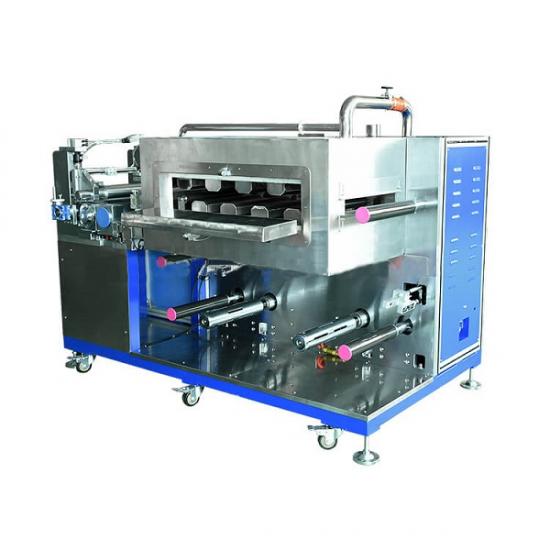Film Applicator Coater: Precision Coating for Research and Industry
A film applicator coater is a machine or tool used to apply a uniform, thin film of liquid material (such as paints, inks, adhesives, or battery slurries) onto various substrates. This equipment is crucial in industries and research fields where precise coating thickness and uniformity are required, including battery manufacturing, solar cells, biomedical devices, and material science. Film Coating Machine provide high control over coating parameters, which enhances product quality and repeatability.
● Types of Film Applicator Coaters
1. Wire-Wound Rod Coaters (Mayer Rods)
- Consist of a rod wound with precision wire to create a uniform coating. The diameter of the wire determines the thickness of the applied film.
- Commonly used for research, especially for thin films in laboratory settings where fine control over small coating areas is needed.
2. Blade or Knife Coaters
- Use a blade or knife to spread the coating fluid, with adjustable height to control thickness. Ideal for thicker coatings and more robust applications.
- Suitable for industrial applications as well as research settings, especially for slurries in battery manufacturing or photovoltaic materials.
3. Slot-Die Coaters
- Utilize a slot-die head to apply liquid material to substrates with high precision.
- Known for producing highly uniform coatings and are widely used in industrial applications, especially for thin films like lithium-ion battery electrodes or perovskite solar cells.
4. Bar or Rod Applicators
- Similar to wire-wound rods but with a smooth surface, they apply coatings in controlled thicknesses, making them effective for consistent, medium-thickness layers.
5. Spray Coaters
- Spray fine droplets of coating solution onto a surface, often used when uniform coverage of complex or textured surfaces is required.
● Key Components of a Film Applicator Coater
1. Coating Head: Holds the application device (such as a blade, rod, or slot-die). The design of the coating head determines the film thickness, precision, and type of coating that can be achieved.
2. Substrate Conveyor: Some coaters have a conveyor system that moves the substrate under the coating head, ensuring even application over larger surfaces.
3. Thickness Control: Mechanisms to adjust the gap between the applicator and the substrate, allowing precise control over coating thickness. This is particularly important in applications requiring highly specific film thickness.
4. Drying System: Built-in heaters or IR lamps to accelerate drying of the applied coating, important for time-sensitive applications or multi-layer coatings.
5. Vacuum System: In some advanced film applicators, a vacuum system holds the substrate securely in place, preventing shifting during coating.
● Applications of Film Applicator Coaters
1. Battery Manufacturing: Film applicator coaters are used to coat electrode slurries onto metallic foils, producing uniform layers essential for battery performance. Precision in coating directly impacts battery energy density, consistency, and longevity.
2. Solar Cells and Photovoltaics: Used to apply uniform thin layers of photovoltaic material (such as perovskites or organic compounds) onto substrates, crucial for efficient solar energy conversion.
3. Pharmaceutical and Biomedical: Apply consistent layers of drug solutions or bioactive compounds onto medical devices and patches, which is critical for dosage accuracy in therapeutic applications.
4. Material Science Research: Film coaters are used in laboratories to test and develop new materials, allowing researchers to experiment with various formulations and thicknesses.
5. Display and Electronics Manufacturing: Apply coatings on displays, sensors, and other electronic components, where thin and uniform layers enhance conductivity, durability, and overall functionality.
● Advantages of Film Applicator Coaters
1. Uniformity and Consistency: Ensure even distribution of coating material, which is essential for applications where uniformity is key to product performance.
2. Precision Control: Adjustable thickness control and high precision make film applicator coaters ideal for research and industries requiring high-quality, repeatable results.
3. Versatility: Suitable for a wide range of coating materials, from low-viscosity solutions to high-viscosity slurries, and adaptable to different substrates.
4. Scalability: Film applicators are available in both laboratory-scale and industrial-scale models, making them ideal for both research and large-scale production.
5. Cost Efficiency: Reduce material wastage by applying only the necessary amount of coating, an advantage in industries where material costs are high.
● Choosing a Film Applicator Coater
- Thickness Requirements: The desired thickness range will determine the type of applicator, with wire-wound rods or slot-die coaters suited to very thin films, while blade coaters handle thicker layers.
- Material Viscosity: Higher-viscosity coatings may require blade or knife coaters, while low-viscosity solutions work well with wire-wound rods or spray coaters.
- Precision Needs: For research applications or high-precision industries like battery or solar cell manufacturing, consider models with advanced thickness control and drying features.
- Substrate Type: Consider whether a flat, flexible, or textured substrate will be used, as some coaters may be better suited for specific substrate types.
● Conclusion
A film applicator coater is an essential tool in various high-precision industries and research labs, providing uniform and consistent coating capabilities. Whether used for thin film research, battery production, or the manufacture of advanced electronic devices, film applicator coaters ensure that coatings are applied accurately, enhancing product quality and consistency.





 Online service
Online service +86 13174506016
+86 13174506016
